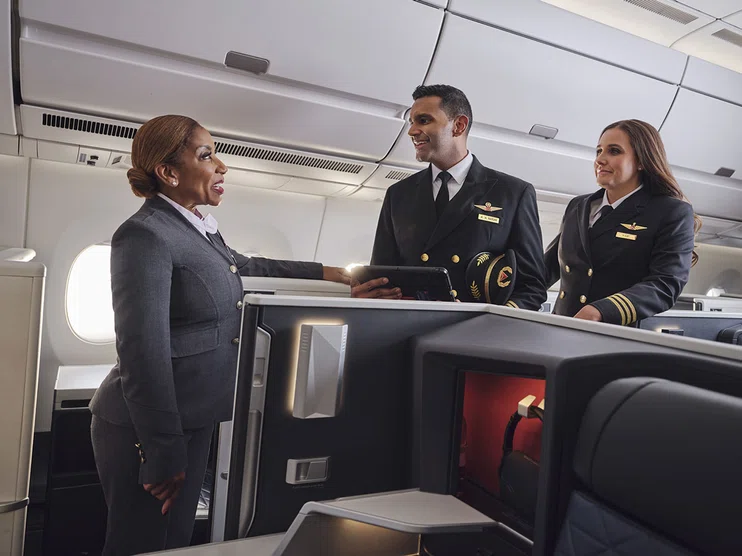Download the report
Legal Disclaimer
© 2023. Delta Air Lines, Inc.



PEOPLE
Talent Management
At Delta, we prepare our employees for key roles and future leadership positions through various training and development programs.
Training
Training
Our objective accelerated in 2022, as we increased our employee base, hiring and training approximately 25,000 new employees. Attrition remains low at 7.8%,1 though slightly elevated from our historical average.
A key piece to improving our employee experience was modernizing our human resources tools and technology by increasing the use of iGrow, our online learning portal. Launched in 2021, iGrow offers career and professional development and an array of skill-building options. The tool is delivered in partnership with core content providers such as Harvard Business Publishing, enabling Delta to offer curated, self-paced growth paths, and is accessible globally to all Delta employees.

These growth paths allow our employees to follow a guided learning journey based on their career track and focus on developing specific skills and competencies aligned with their performance goals. Coupled with iGrow are our other synchronous and asynchronous career and skills training offerings that give our employees access to additional resources.
The table below illustrates the average computer-based training hours logged by employees per division by merit and scale in 2022.
These numbers do not include in-person or hands-on qualification training and testing hours, simulator time, etc.
Average hours of computer-based training provided per corporate employee
Average hours of computer-based training provided per corporate employee
Merit2
Airport Customer Service
17
Cargo
21
Flight Operations
8
Inflight Services
9
Reservations
102
Technical Operations
34
Corporate
5
Scale3
Airport Customer Service
11
Cargo
22
Flight Operations
53
Inflight Services
37
Reservations
201
Technical Operations
72
Corporate
8
Flight Attendants
Inflight Services
9
Pilots
Flight Operations
12
1 Attrition rate includes domestic and international employees of Delta Air Lines, excluding seasonal employees and those who worked less than two days.
2 Merit contributors are paid a salary based on benchmark data from their peers at Delta and across multiple industries and are evaluated on categories spanning skill and experience to innovation and leadership.
3 Scale employees are paid an hourly wage while also receiving competitive pay offerings and flexible benefits driven by performance, and include pilots, flight attendants, maintenance technicians, customer service and reservation agents, baggage handlers and more.
ACS
CGO
FOP
IFS
RES
TOP
CORP
Merit2
17
21
8
9
102
34
5
Scale3
11
22
53
37
201
72
8
Flight Attendants
9
Pilots
12
(ACS) Airport Customer Service | (CGO) Cargo | (FOP) Flight Operations | (IFS) Inflight Services | (RES) Reservations
(TOP) Technical Operations | (CORP) Corporate

We aim to fill at least 25% of our internal professional-level positions with diverse frontline talent, enabling transition into corporate career roles including business support or management positions.
Skills-First
Skills-First
Our equity-focused career development model emphasizes the value of skills and competencies over job histories and traditional degrees. Expanding our commitment to the OneTen coalition, in January 2022, we dropped our degree requirement for pilots following similar work we did in 2021 for our merit roles. While we work to catalog unique skills associated with specific roles, we have taken a more critical lens with job postings to ensure job requirements are clearer. Additionally, we expanded the usage of our internal “career talent profile” allowing our recruiters to search internal candidates by their experience and listed skills.
To complement our strategy, we launched our Skills-First Apprenticeship Program, which centers on hiring, developing and promoting people with relevant skills and experience for open roles within the company. Under the program, apprentices work full-time in an immersive “earn while you learn” experience, which concludes with a formal transition into a role on that team. Apprentices receive access to leadership support, mentor sessions and engagements to expand their knowledge while developing a personal brand.
We started the Delta Analytics Academy to address the demand for data analytics expertise. Together with Georgia State University (GSU), we offer a three-semester program for Delta Analytics Academy participants. Our inaugural class of Atlanta-based Delta employees will acquire the tools to enter the analytics field without traditional education or cost barriers. The academy begins with a virtual learning environment that allows students to remain in their current positions at Delta. Upon completion, graduates receive a co-branded certificate from GSU and Delta and a guaranteed interview for a full-time role in analytics within our enterprise. We offer several other programs tailored to specific skill sets and workgroups in conjunction with the apprenticeship program.
Through our Propel program, launched in 2018, Delta offers multiple pathways for qualified talent to enter the pilot profession. To date, over 100 participants have completed a pathway and are now flying for Delta, while another 700 pilots are currently enrolled in the program and working toward the same goal.
In early 2022, Delta announced that Hampton University would join the Propel Collegiate Pilot Career Path Program, the airline’s first such partnership with a historically Black university, and we added Elizabeth City State University to that effort in 2023.
Delta also announced in 2023 that through our Propel Pilot Career Path Program, we would launch our fourth pathway for aspiring pilots: a dedicated pilot training academy in partnership with Skyborne Airline Academy. Student pilots will be eligible to receive up to $20,000 from Delta in financial support. Delta will also cover the cost of interest on student loans from select lenders.
In 2022, we held the first class of our Delta Dispatch Academy, open to Delta employees interested in furthering their careers as Flight Superintendents (Flight Dispatchers). Delta is the only airline accredited by the Federal Aviation Administration (FAA) to conduct Aircraft Dispatch Certification. Upon completing the 200+ required hours of instruction and certification, we guarantee employees an interview for a Delta Flight Superintendent position.
Skills-First Increases Employee Engagement and Drives High Performance
Skills-First Increases Employee Engagement and Drives High Performance
Skills-First connects all the critical talent areas of impact to enrich the careers at the moments that matter throughout the employee experience ribbon.
By providing clear and well-defined career pathways, our employees gain greater access to internal opportunities and agency in their career decision-making. We provide targeted development, upskilling and resources to help our employees grow and mature in their new roles.
Areas of Impact
Areas of Impact



Attract & Mobilize Talent
Attract & Mobilize Talent
Expand recruitment outreach to build a diverse, skilled pipeline
Expand recruitment outreach to build a diverse, skilled pipeline

Expand talent pipeline through strategic diversity recruitment

Leverage job data and talent profiles to direct-source applicants for open roles

Fill 25% of merit roles by prioritizing internal mobility
Engage & Grow Talent
Engage & Grow Talent
Targeted development &
career enrichment
Targeted development &
career enrichment

Ensure a foundation of success through enhanced onboarding

Develop leaders at every level to be strong coaches and culture carriers who lead high-performing teams

Cultivate a diverse workforce of skilled, and job-ready talent through targeted development and career-enriching programs
Transparent &
Equitable Processes
Transparent &
Equitable Processes
Remove bias and ensure consistent practices embodied in our culture
Remove bias and ensure consistent practices embodied in our culture

Integrate skills-based best practices throughout talent life cycle

Ensure operating processes are anti-bias and they increase equity in the talent selection and planning processes

Provide viable feedback loops to candidates to support continued growth
Align equity and Skills-First practices with total rewards
Infrastructure & Technology
Infrastructure & Technology
Tools and technology to enable skills-centered dialogues
Connect our systems and increase reliability of our data through Skills-First modernization of talent systems such as:

A structure to inventory skills and link the skills to jobs

Implementation of a solution that provides visibility of the required skills by job and with links to learning opportunities
Enhance iGrow to make it a centralized portal with resources for learning in the flow of work and for what you need to learn










